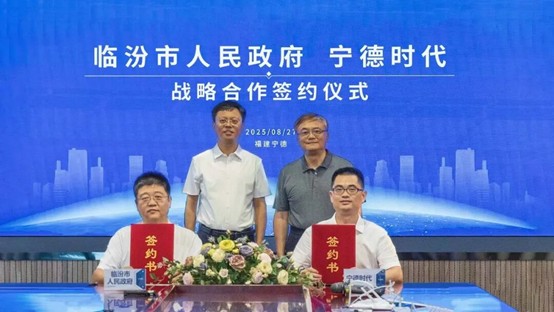CATL Deepens Cooperation with Linfen Municipal Government on Zero-Carbon Transport
On August 27, CATL and the city of Linfen in Shanxi Province officially signed a strategic cooperation agreement. Both parties will leverage the region's abundant green power resources, including wind and solar energy, to deepen collaboration in developing zero-carbon transportation corridors for heavy-duty trucks, promoting integrated applications of new energy, and facilitating industrial upgrading. By the end of this year, CATL will deploy 1,000 heavy-duty trucks equipped with chassis-swappable batteries and establish 41 QIJI Battery Swap Stations in the city, with plans to expand the network to 60 stations in the future. By 2030, the two parties aim to deploy a cumulative total of 50,000 heavy-duty trucks featuring chassis-based battery swapping.

Shanxi, which holds a quarter of China's total coal reserves, is a pivotal and comprehensive energy hub currently accelerating the transition of its energy structure. This signing marks the first municipal-level project to be implemented under the strategic cooperation between CATL and Shanxi Province, representing a concrete step forward in their joint efforts to develop zero-carbon transportation and advance energy reform.
To facilitate the establishment of a zero-carbon heavy-duty truck transportation network, both parties will fully leverage their respective strengths to jointly develop large-scale asset operation platforms and a battery leasing center for heavy-duty trucks. These initiatives aim to address challenges such as high battery ownership costs, difficulties in energy replenishment, and low operational efficiency faced by fleet operators. The Linfen Municipal Government will also provide comprehensive support in land resources and power supply infrastructure to facilitate the construction of battery swap stations.
Furthermore, the city will provide support to CATL in developing centralized and distributed photovoltaic projects, aiming to establish a closed-loop ecosystem of "Green Power Generation–Intelligent Consumption–Zero-carbon Transportation" and achieve in-depth integration between the two key industries: transportation and energy. Moving forward, both parties will explore the large-scale application of electric vehicles (EVs) in sanitation and logistics scenarios. Additionally, they will drive the transformation and upgrading of local industries through circular economy initiatives and the development of an electric heavy-duty truck industrial cluster.
By clicking on the button “I accept” or by further usage of this website you express consent with usage of cookies as well as you grant us the permission to collect and process personal data about your activity on this website. Such information are used to determine personalised content and display of the relevant advertisement on social networks and other websites. More information about personal data processing can be found on this link. Read More
